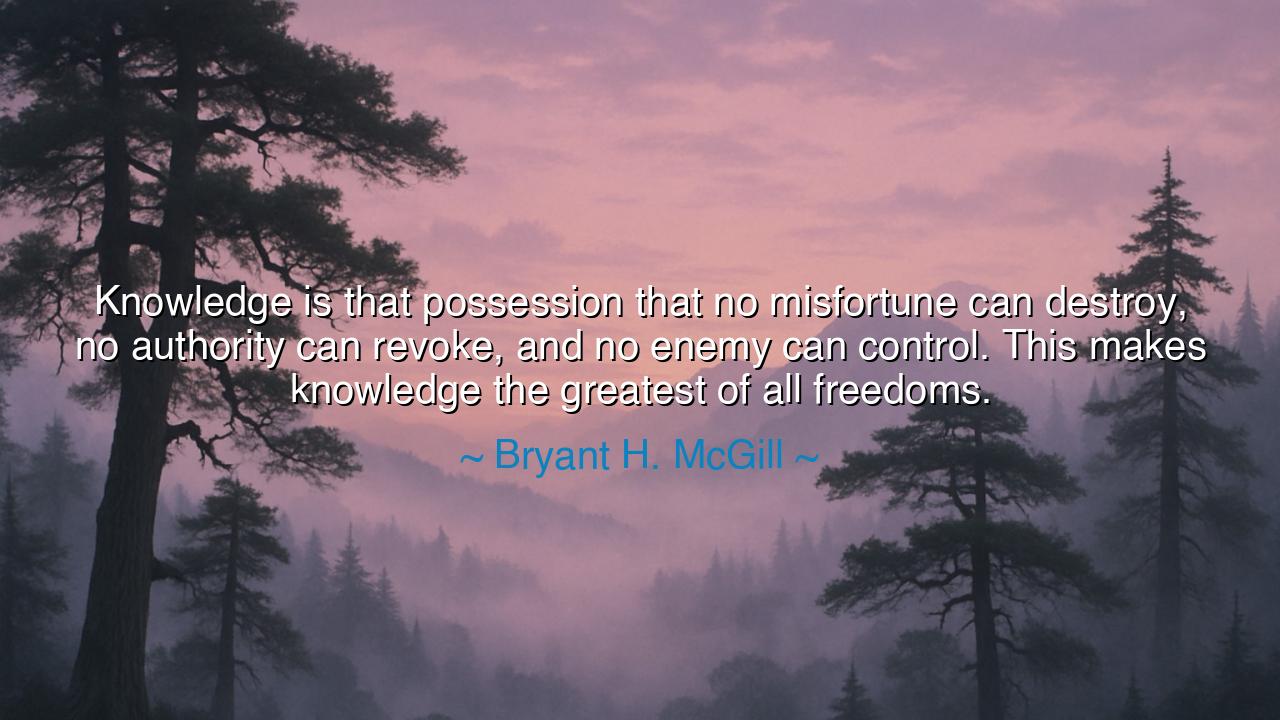
Knowledge is that possession that no misfortune can destroy, no
Knowledge is that possession that no misfortune can destroy, no authority can revoke, and no enemy can control. This makes knowledge the greatest of all freedoms.






Bryant H. McGill, with the vision of a sage, declared: “Knowledge is that possession that no misfortune can destroy, no authority can revoke, and no enemy can control. This makes knowledge the greatest of all freedoms.” These words strike like a bell in the chambers of the soul, reminding us that while wealth may vanish, kingdoms may fall, and bodies may wither, the treasure of knowledge endures beyond all outward loss. It is the one possession that no thief can steal, no tyrant can burn, no storm can wash away.
The origin of this truth is as ancient as humanity itself. From the earliest civilizations, men and women understood that gold could be plundered, land could be seized, but the wisdom stored within the mind was untouchable. In the burning of the Library of Alexandria, countless scrolls were lost, yet the philosophers who carried truth within their minds ensured that much of it survived. Empires crumble and laws change, yet the knowledge of mathematics, music, philosophy, and science passes on like an immortal flame. Thus McGill, standing in the lineage of this wisdom, proclaims knowledge as the greatest freedom.
History offers vivid examples. Consider the life of Frederick Douglass, born into slavery, denied every outward freedom. Yet by secretly learning to read, he gained the inner knowledge that transformed his destiny. Chains bound his body, but they could not bind his mind. He himself testified that literacy was the pathway from slavery to freedom. Douglass’ story proves McGill’s words: no authority could revoke what he had learned, and no enemy could control the flame that knowledge had kindled within him.
The ancients too sang of this truth. Socrates, condemned by the city of Athens, drank the cup of hemlock with serenity, for though they took his life, they could not strip him of knowledge. Galileo, threatened by the Inquisition, was forced to recant, yet the truth of the moving earth remained in his heart, untouched by authority. These men remind us that misfortune and power may wound the body, but they cannot extinguish the mind illuminated by truth.
The deeper meaning of McGill’s words is this: knowledge is the truest form of liberty because it makes the spirit unconquerable. A person armed with wisdom may live in poverty yet remain rich; may face oppression yet remain free; may encounter defeat yet carry within them the seeds of victory. For knowledge gives discernment, resilience, and the vision to rise above circumstances. While all else may be taken, the educated mind cannot be enslaved.
The lesson is eternal: pursue knowledge above all material possessions. Gather it not for pride, but for freedom. Understand that in moments of crisis, it is not wealth that saves, but wisdom—knowing how to adapt, how to endure, how to build anew. This is why societies that invest in learning become strong, while those that scorn it fall swiftly into decay. To despise knowledge is to surrender freedom itself; to honor it is to secure liberty for generations.
Practical action lies before us. Read deeply, and never cease to learn. Listen to teachers, sages, and the quiet lessons of experience. Share what you know, for in giving knowledge you strengthen others against misfortune and tyranny. Defend schools, libraries, and places of learning, for they are the fortresses of freedom. And most of all, cultivate wisdom within yourself, for it is the one treasure that can never be revoked, never controlled, never destroyed.
Thus McGill’s words ring like a timeless decree: knowledge is the crown of the free soul, the fortress no enemy can breach, the flame no darkness can quench. Let us pass this truth to our children, that they may walk not in chains of ignorance, but in the boundless liberty of wisdom. For in knowledge, we find the greatest of all freedoms.






AAdministratorAdministrator
Welcome, honored guests. Please leave a comment, we will respond soon